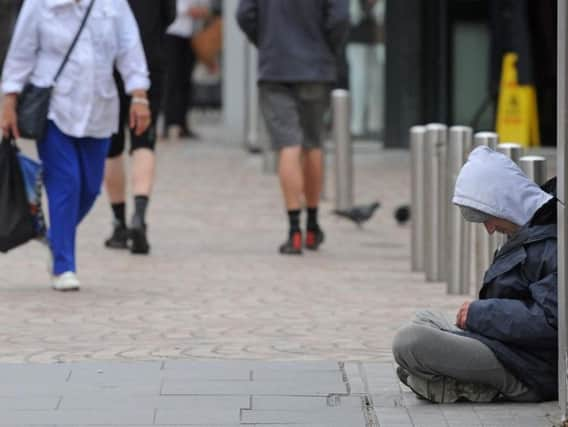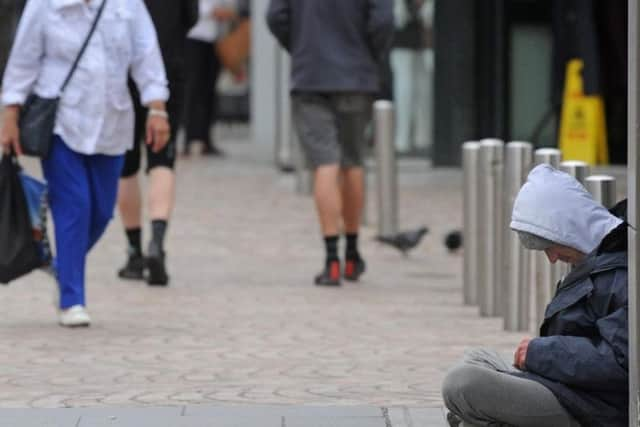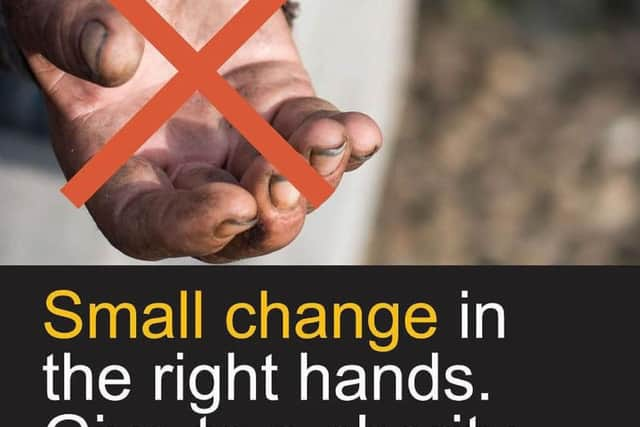Campaign to stop shoppers in Yorkshire city giving money to beggars provokes mixed reaction


A partnership including the council, Humberside Police, and business group Hull BID, launched the advertising campaign today saying a high percentage of beggars are begging to support a drug habit.
Billboards will encourage people to give money to registered charities, while the force said it was putting on extra two police officers on patrol this month.
Advertisement
Hide AdAdvertisement
Hide AdThe partnership is also suggesting that soup kitchens and other unregistered charities are part of the problem.


Some residents rang a local radio show to say they were fed up with being accosted by aggressive beggars and were not coming into the city centre any more.
One said: "Basically there are 21 people holding the city to ransom." Another said: "Some make £600 a week - police need to enforce the Vagrancy Act."
However unregistered charity Hull Homeless Outreach, which has a soup kitchen on Wednesdays and Thursdays, said the council "would sweep us all under the carpet if they could."
Advertisement
Hide AdAdvertisement
Hide AdJane D'Arcy, one of the directors, said the move was "disgusting", adding:"We are supported by Tesco, KFC, Nandos - Aldi is one of our biggest at the moment.


"We feed up to 80 people which shows that there is a bigger need than Hull Council will ever admit.
"Not all the people we feed have drink and drug problems - not all are homeless, some are in hostels and in flats, but are learning to budget. It gives them somewhere safe."
But Rich Sharp Wilson whose cafe on Whitefriargate invites people to buy food and drink for a "stranger in need" said he agreed with the idea in general.
Advertisement
Hide AdAdvertisement
Hide AdHe said: "On the surface I do agree because a lot of money does go on drugs. Not all of course. I know one lad who was earning £60 to £80 a day sat in a doorway here."
But he doesn't believe the campaign will change habits, adding: "If anything the nature of people of Hull they will do the opposite. People will ignore the council."
In a statement the partnership said giving to beggars directly “can help sustain the lifestyles of those at risk” .
It added: “Soup kitchens and other unregistered charities can also sustain these lifestyles. Our data shows a high percentage of beggars are begging to support a drug habit.
Advertisement
Hide AdAdvertisement
Hide Ad“This group has not been set up to demonise those who might feel that asking for donations is their only option – quite the opposite.”
The problem is seen on the streets of all the major cities in Yorkshire but councils have taken different approaches.
In Leeds, Leeds BID together with more than 45 third sector organisations launched the Big Change scheme which encourages people to make donation to a a grant programme managed by the Leeds Community Foundation - rather than giving money directly to people on the street.
They also launched a new Street Support Team to deal with rough sleepers, begging and anti-social and criminal behaviour "there and then" on the street, rather than referring people on for appointments.
Advertisement
Hide AdAdvertisement
Hide AdThe problems in Hull first came to the fore last year when the city centre saw a sharp rise in drug users using the so-called “zombie” drug Spice.
Police have since made more than 300 arrests, stopped, searched and spoken with over a thousand people, and issued more than 600 dispersal orders as part of Operation Ignition.
Rough sleeping is estimated to have risen by around 30 per cent across Yorkshire in the last five years.
In the last rough sleeper count, 26 people were found to be sleeping rough across Hull, the second-highest figure on record.